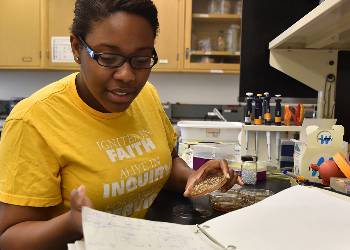TA TEACHING TIPS
Establishing an Effective Teaching Persona
As you prepare to introduce yourself and your course, spend some time reflecting on self-presentation: what kind of persona do you want to project in your teaching? Aim for a tone that is friendly, firm, and fair. The following questions will help you establish that tone:
- How will you refer to students?
Make sure that you know each of the students in your lab by name. You will fill in a seating chart so that students sit at the same stations each week. - How will your age, gender, race, ethnicity, and any other aspects of your identity write themselves into your teaching persona?
Identity is a crucial element of all teaching lives (and student lives), so reflecting on aspects of identity and their relationship to your teaching persona is especially important. It is also important to be aware of interpersonal dynamics within your class. Make it clear by both your words and actions that your classroom is a safe space and that insults or derogatory comments about any groups are unacceptable. - How will your choice of demeanor, dress, and language affect student perception?
Be aware that students draw conclusions based on such characteristics all the time, and that such conclusions affect your teaching environment. In general, more formal clothing suggests authority and credibility. - How will your knowledge of biology and scientific communication relate to the persona you project?
Every TA is responsible for knowing the material covered in the lab each week and understanding its experimental and conceptual context. Although you will be given a TA handout each week with commentary about the lab, make sure that you can answer all of the questions that the students are asked to answer without the use of a cheat-sheet. In addition to the weekly group meetings, you should spend time reviewing the content and practicing your lab-talk presentation. Recognize that you will make some mistakes. Shake it off, and then correct it as soon as possible, in the next class period at the latest. Ask the Lab Supervisors and/or class lecture professors if you have questions about the material. - How will you interact with students in situations outside of class?
Be friendly, but professional. Students learn best when there is a congenial relationship between themselves and their instructors, but your job is to help them learn, not to be their pal. No close friends or relatives should be enrolled in your lab session. - How will you deal with students in crisis?
Take student concerns seriously. Get faculty advice when students come to you with serious problems. Depending on the nature of their situation, refer students to the following as needed: - Academic Resource Center (tutoring)
- Office of Disability Services
- Counseling Center
- LGBTQ Resource Center
- Campus Ministry
- Their academic advisor
